Business Law Assignment: Contract Law Analysis and Problem Solving
VerifiedAdded on 2023/01/16
|10
|2976
|73
Homework Assignment
AI Summary
This assignment solution addresses a business law problem concerning contract formation between Rigby Corporate Function Planners Pty Ltd and Events Management Ltd. The analysis employs the Issue, Rule, Application, and Conclusion (IRAC) method. Part A examines whether a valid contract was created, considering offer, acceptance, consideration, and the intention to create legal relations, referencing relevant case law like Smith v Hughes and Ermogenous v Greek Orthodox Community of SA Inc. The application analyzes email communications and financial considerations, concluding that no contract was formed due to unresolved terms. Part B focuses on whether Events Management can rely on Masters v Cameron to prove a contract's existence, reiterating contract formation principles and the importance of a complete agreement. The assignment highlights the necessity of all essential elements for a binding contract and the impact of unresolved terms on its validity.
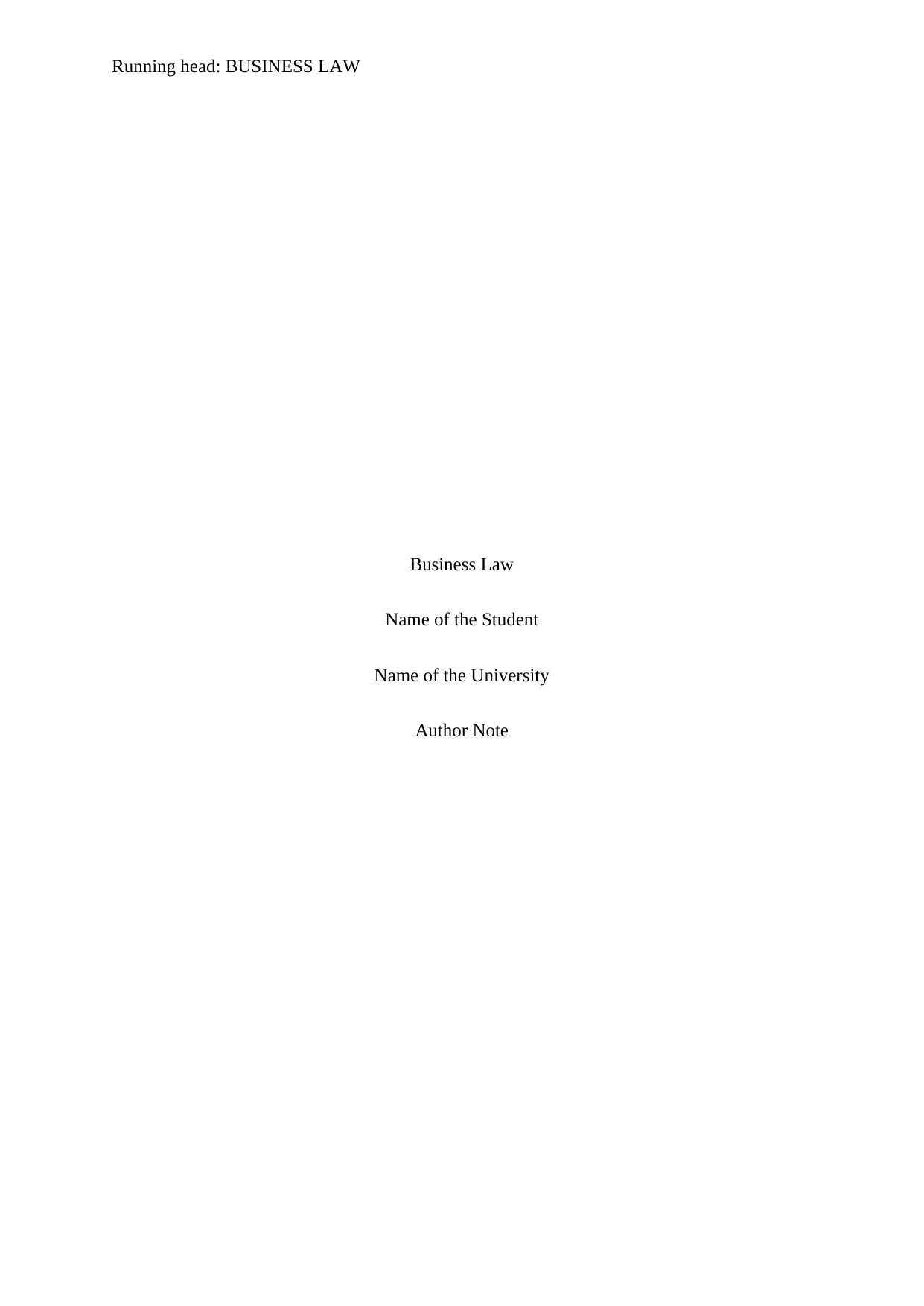
Running head: BUSINESS LAW
Business Law
Name of the Student
Name of the University
Author Note
Business Law
Name of the Student
Name of the University
Author Note
Paraphrase This Document
Need a fresh take? Get an instant paraphrase of this document with our AI Paraphraser
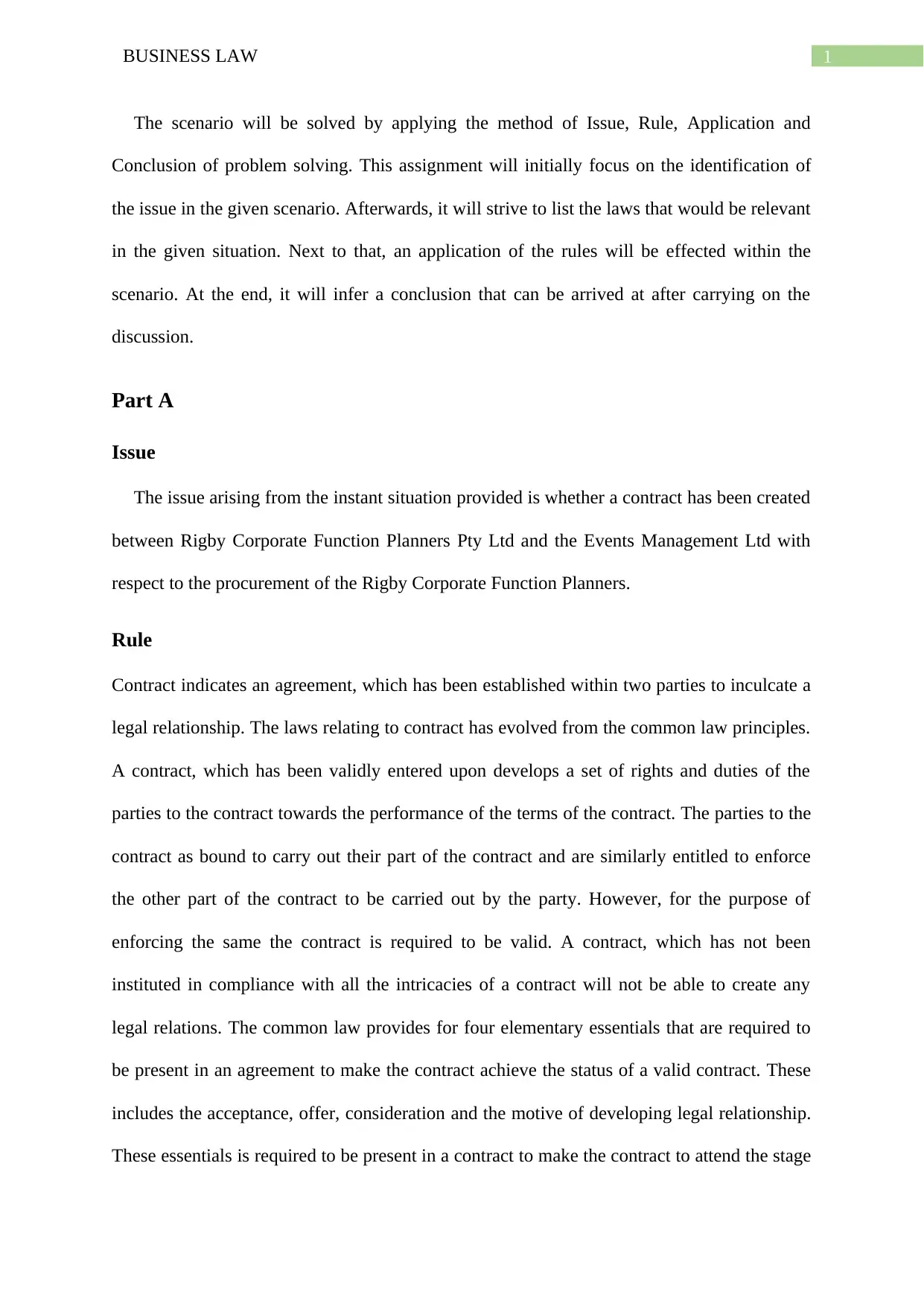
1BUSINESS LAW
The scenario will be solved by applying the method of Issue, Rule, Application and
Conclusion of problem solving. This assignment will initially focus on the identification of
the issue in the given scenario. Afterwards, it will strive to list the laws that would be relevant
in the given situation. Next to that, an application of the rules will be effected within the
scenario. At the end, it will infer a conclusion that can be arrived at after carrying on the
discussion.
Part A
Issue
The issue arising from the instant situation provided is whether a contract has been created
between Rigby Corporate Function Planners Pty Ltd and the Events Management Ltd with
respect to the procurement of the Rigby Corporate Function Planners.
Rule
Contract indicates an agreement, which has been established within two parties to inculcate a
legal relationship. The laws relating to contract has evolved from the common law principles.
A contract, which has been validly entered upon develops a set of rights and duties of the
parties to the contract towards the performance of the terms of the contract. The parties to the
contract as bound to carry out their part of the contract and are similarly entitled to enforce
the other part of the contract to be carried out by the party. However, for the purpose of
enforcing the same the contract is required to be valid. A contract, which has not been
instituted in compliance with all the intricacies of a contract will not be able to create any
legal relations. The common law provides for four elementary essentials that are required to
be present in an agreement to make the contract achieve the status of a valid contract. These
includes the acceptance, offer, consideration and the motive of developing legal relationship.
These essentials is required to be present in a contract to make the contract to attend the stage
The scenario will be solved by applying the method of Issue, Rule, Application and
Conclusion of problem solving. This assignment will initially focus on the identification of
the issue in the given scenario. Afterwards, it will strive to list the laws that would be relevant
in the given situation. Next to that, an application of the rules will be effected within the
scenario. At the end, it will infer a conclusion that can be arrived at after carrying on the
discussion.
Part A
Issue
The issue arising from the instant situation provided is whether a contract has been created
between Rigby Corporate Function Planners Pty Ltd and the Events Management Ltd with
respect to the procurement of the Rigby Corporate Function Planners.
Rule
Contract indicates an agreement, which has been established within two parties to inculcate a
legal relationship. The laws relating to contract has evolved from the common law principles.
A contract, which has been validly entered upon develops a set of rights and duties of the
parties to the contract towards the performance of the terms of the contract. The parties to the
contract as bound to carry out their part of the contract and are similarly entitled to enforce
the other part of the contract to be carried out by the party. However, for the purpose of
enforcing the same the contract is required to be valid. A contract, which has not been
instituted in compliance with all the intricacies of a contract will not be able to create any
legal relations. The common law provides for four elementary essentials that are required to
be present in an agreement to make the contract achieve the status of a valid contract. These
includes the acceptance, offer, consideration and the motive of developing legal relationship.
These essentials is required to be present in a contract to make the contract to attend the stage
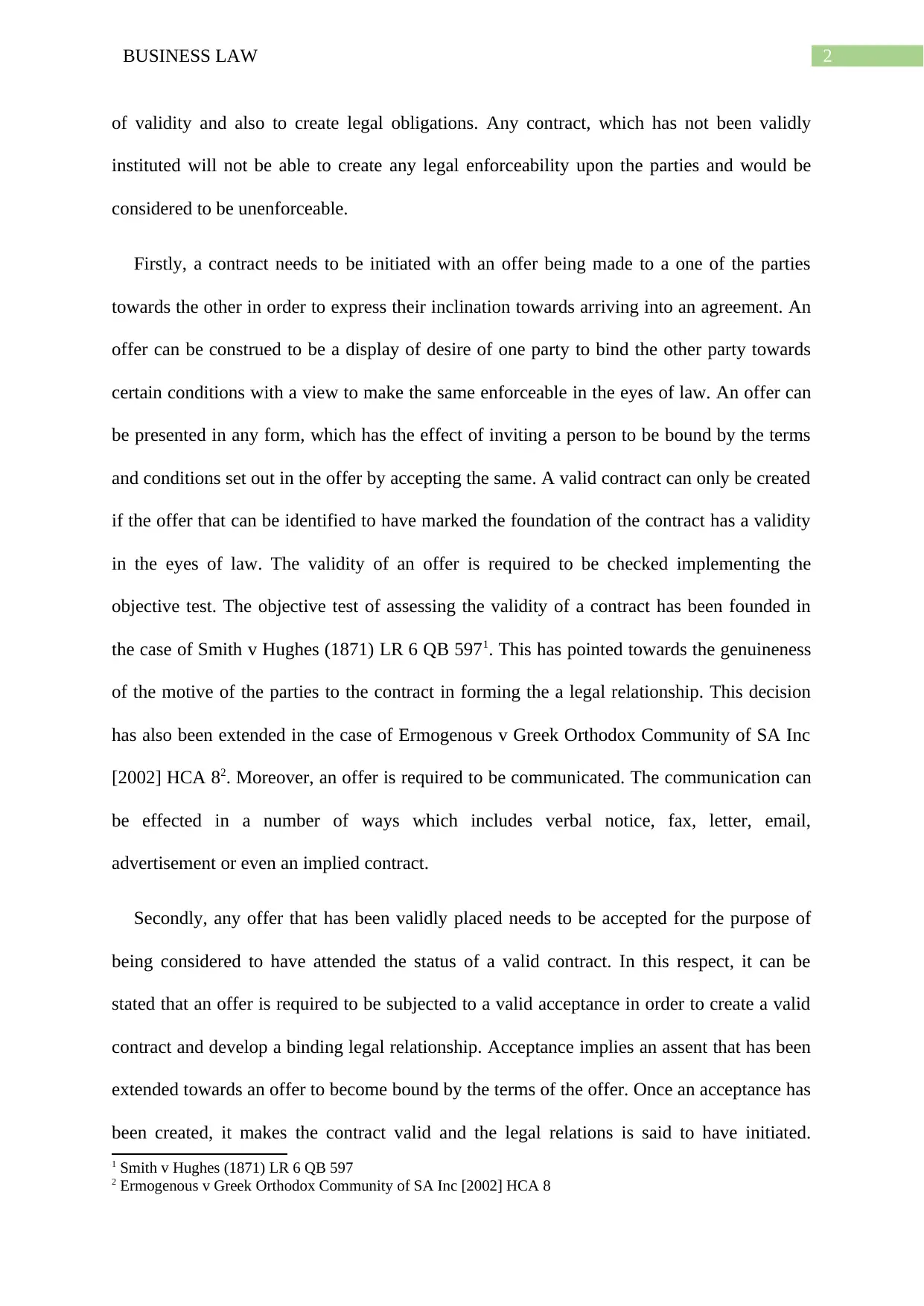
2BUSINESS LAW
of validity and also to create legal obligations. Any contract, which has not been validly
instituted will not be able to create any legal enforceability upon the parties and would be
considered to be unenforceable.
Firstly, a contract needs to be initiated with an offer being made to a one of the parties
towards the other in order to express their inclination towards arriving into an agreement. An
offer can be construed to be a display of desire of one party to bind the other party towards
certain conditions with a view to make the same enforceable in the eyes of law. An offer can
be presented in any form, which has the effect of inviting a person to be bound by the terms
and conditions set out in the offer by accepting the same. A valid contract can only be created
if the offer that can be identified to have marked the foundation of the contract has a validity
in the eyes of law. The validity of an offer is required to be checked implementing the
objective test. The objective test of assessing the validity of a contract has been founded in
the case of Smith v Hughes (1871) LR 6 QB 5971. This has pointed towards the genuineness
of the motive of the parties to the contract in forming the a legal relationship. This decision
has also been extended in the case of Ermogenous v Greek Orthodox Community of SA Inc
[2002] HCA 82. Moreover, an offer is required to be communicated. The communication can
be effected in a number of ways which includes verbal notice, fax, letter, email,
advertisement or even an implied contract.
Secondly, any offer that has been validly placed needs to be accepted for the purpose of
being considered to have attended the status of a valid contract. In this respect, it can be
stated that an offer is required to be subjected to a valid acceptance in order to create a valid
contract and develop a binding legal relationship. Acceptance implies an assent that has been
extended towards an offer to become bound by the terms of the offer. Once an acceptance has
been created, it makes the contract valid and the legal relations is said to have initiated.
1 Smith v Hughes (1871) LR 6 QB 597
2 Ermogenous v Greek Orthodox Community of SA Inc [2002] HCA 8
of validity and also to create legal obligations. Any contract, which has not been validly
instituted will not be able to create any legal enforceability upon the parties and would be
considered to be unenforceable.
Firstly, a contract needs to be initiated with an offer being made to a one of the parties
towards the other in order to express their inclination towards arriving into an agreement. An
offer can be construed to be a display of desire of one party to bind the other party towards
certain conditions with a view to make the same enforceable in the eyes of law. An offer can
be presented in any form, which has the effect of inviting a person to be bound by the terms
and conditions set out in the offer by accepting the same. A valid contract can only be created
if the offer that can be identified to have marked the foundation of the contract has a validity
in the eyes of law. The validity of an offer is required to be checked implementing the
objective test. The objective test of assessing the validity of a contract has been founded in
the case of Smith v Hughes (1871) LR 6 QB 5971. This has pointed towards the genuineness
of the motive of the parties to the contract in forming the a legal relationship. This decision
has also been extended in the case of Ermogenous v Greek Orthodox Community of SA Inc
[2002] HCA 82. Moreover, an offer is required to be communicated. The communication can
be effected in a number of ways which includes verbal notice, fax, letter, email,
advertisement or even an implied contract.
Secondly, any offer that has been validly placed needs to be accepted for the purpose of
being considered to have attended the status of a valid contract. In this respect, it can be
stated that an offer is required to be subjected to a valid acceptance in order to create a valid
contract and develop a binding legal relationship. Acceptance implies an assent that has been
extended towards an offer to become bound by the terms of the offer. Once an acceptance has
been created, it makes the contract valid and the legal relations is said to have initiated.
1 Smith v Hughes (1871) LR 6 QB 597
2 Ermogenous v Greek Orthodox Community of SA Inc [2002] HCA 8
⊘ This is a preview!⊘
Do you want full access?
Subscribe today to unlock all pages.

Trusted by 1+ million students worldwide
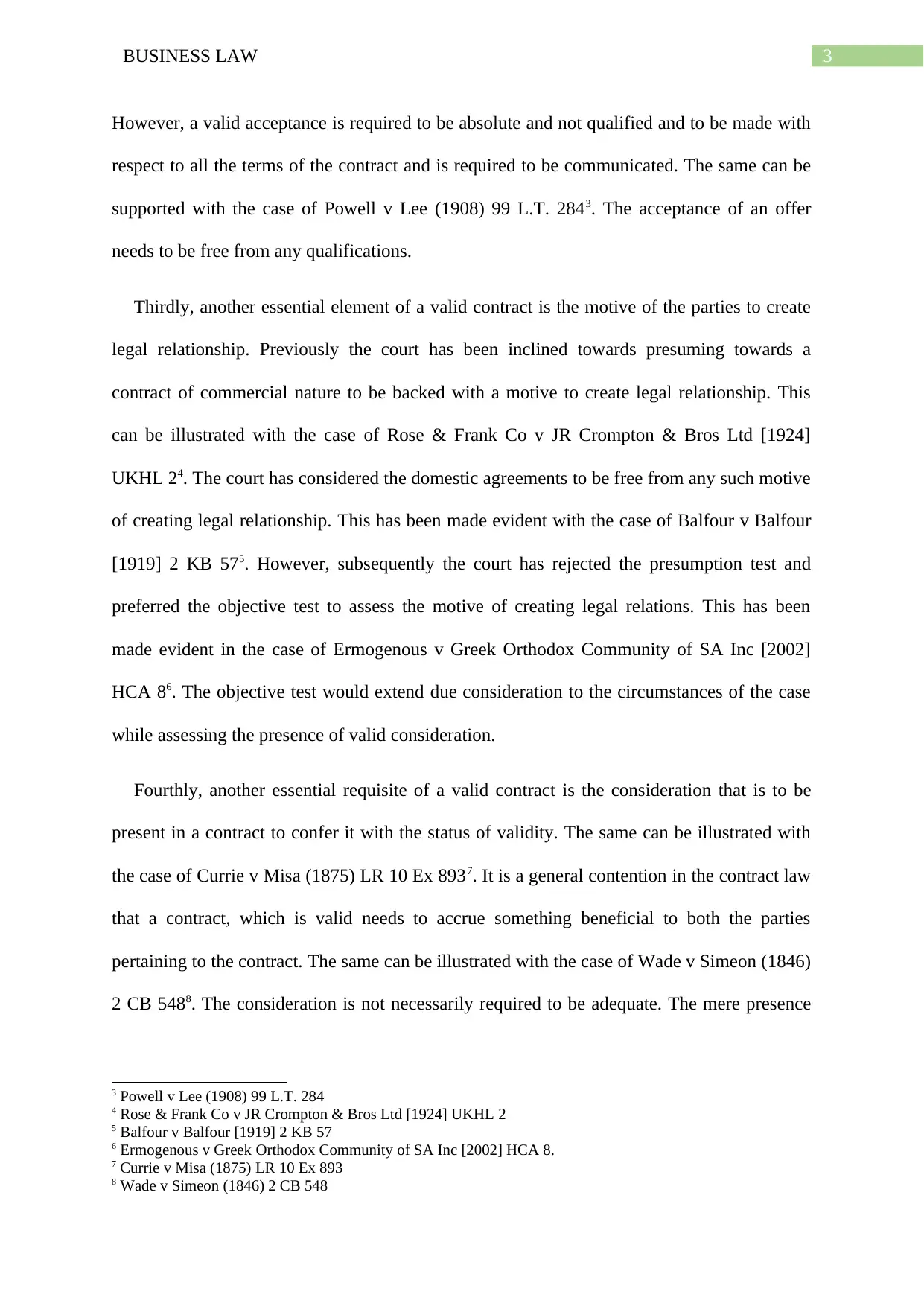
3BUSINESS LAW
However, a valid acceptance is required to be absolute and not qualified and to be made with
respect to all the terms of the contract and is required to be communicated. The same can be
supported with the case of Powell v Lee (1908) 99 L.T. 2843. The acceptance of an offer
needs to be free from any qualifications.
Thirdly, another essential element of a valid contract is the motive of the parties to create
legal relationship. Previously the court has been inclined towards presuming towards a
contract of commercial nature to be backed with a motive to create legal relationship. This
can be illustrated with the case of Rose & Frank Co v JR Crompton & Bros Ltd [1924]
UKHL 24. The court has considered the domestic agreements to be free from any such motive
of creating legal relationship. This has been made evident with the case of Balfour v Balfour
[1919] 2 KB 575. However, subsequently the court has rejected the presumption test and
preferred the objective test to assess the motive of creating legal relations. This has been
made evident in the case of Ermogenous v Greek Orthodox Community of SA Inc [2002]
HCA 86. The objective test would extend due consideration to the circumstances of the case
while assessing the presence of valid consideration.
Fourthly, another essential requisite of a valid contract is the consideration that is to be
present in a contract to confer it with the status of validity. The same can be illustrated with
the case of Currie v Misa (1875) LR 10 Ex 8937. It is a general contention in the contract law
that a contract, which is valid needs to accrue something beneficial to both the parties
pertaining to the contract. The same can be illustrated with the case of Wade v Simeon (1846)
2 CB 5488. The consideration is not necessarily required to be adequate. The mere presence
3 Powell v Lee (1908) 99 L.T. 284
4 Rose & Frank Co v JR Crompton & Bros Ltd [1924] UKHL 2
5 Balfour v Balfour [1919] 2 KB 57
6 Ermogenous v Greek Orthodox Community of SA Inc [2002] HCA 8.
7 Currie v Misa (1875) LR 10 Ex 893
8 Wade v Simeon (1846) 2 CB 548
However, a valid acceptance is required to be absolute and not qualified and to be made with
respect to all the terms of the contract and is required to be communicated. The same can be
supported with the case of Powell v Lee (1908) 99 L.T. 2843. The acceptance of an offer
needs to be free from any qualifications.
Thirdly, another essential element of a valid contract is the motive of the parties to create
legal relationship. Previously the court has been inclined towards presuming towards a
contract of commercial nature to be backed with a motive to create legal relationship. This
can be illustrated with the case of Rose & Frank Co v JR Crompton & Bros Ltd [1924]
UKHL 24. The court has considered the domestic agreements to be free from any such motive
of creating legal relationship. This has been made evident with the case of Balfour v Balfour
[1919] 2 KB 575. However, subsequently the court has rejected the presumption test and
preferred the objective test to assess the motive of creating legal relations. This has been
made evident in the case of Ermogenous v Greek Orthodox Community of SA Inc [2002]
HCA 86. The objective test would extend due consideration to the circumstances of the case
while assessing the presence of valid consideration.
Fourthly, another essential requisite of a valid contract is the consideration that is to be
present in a contract to confer it with the status of validity. The same can be illustrated with
the case of Currie v Misa (1875) LR 10 Ex 8937. It is a general contention in the contract law
that a contract, which is valid needs to accrue something beneficial to both the parties
pertaining to the contract. The same can be illustrated with the case of Wade v Simeon (1846)
2 CB 5488. The consideration is not necessarily required to be adequate. The mere presence
3 Powell v Lee (1908) 99 L.T. 284
4 Rose & Frank Co v JR Crompton & Bros Ltd [1924] UKHL 2
5 Balfour v Balfour [1919] 2 KB 57
6 Ermogenous v Greek Orthodox Community of SA Inc [2002] HCA 8.
7 Currie v Misa (1875) LR 10 Ex 893
8 Wade v Simeon (1846) 2 CB 548
Paraphrase This Document
Need a fresh take? Get an instant paraphrase of this document with our AI Paraphraser
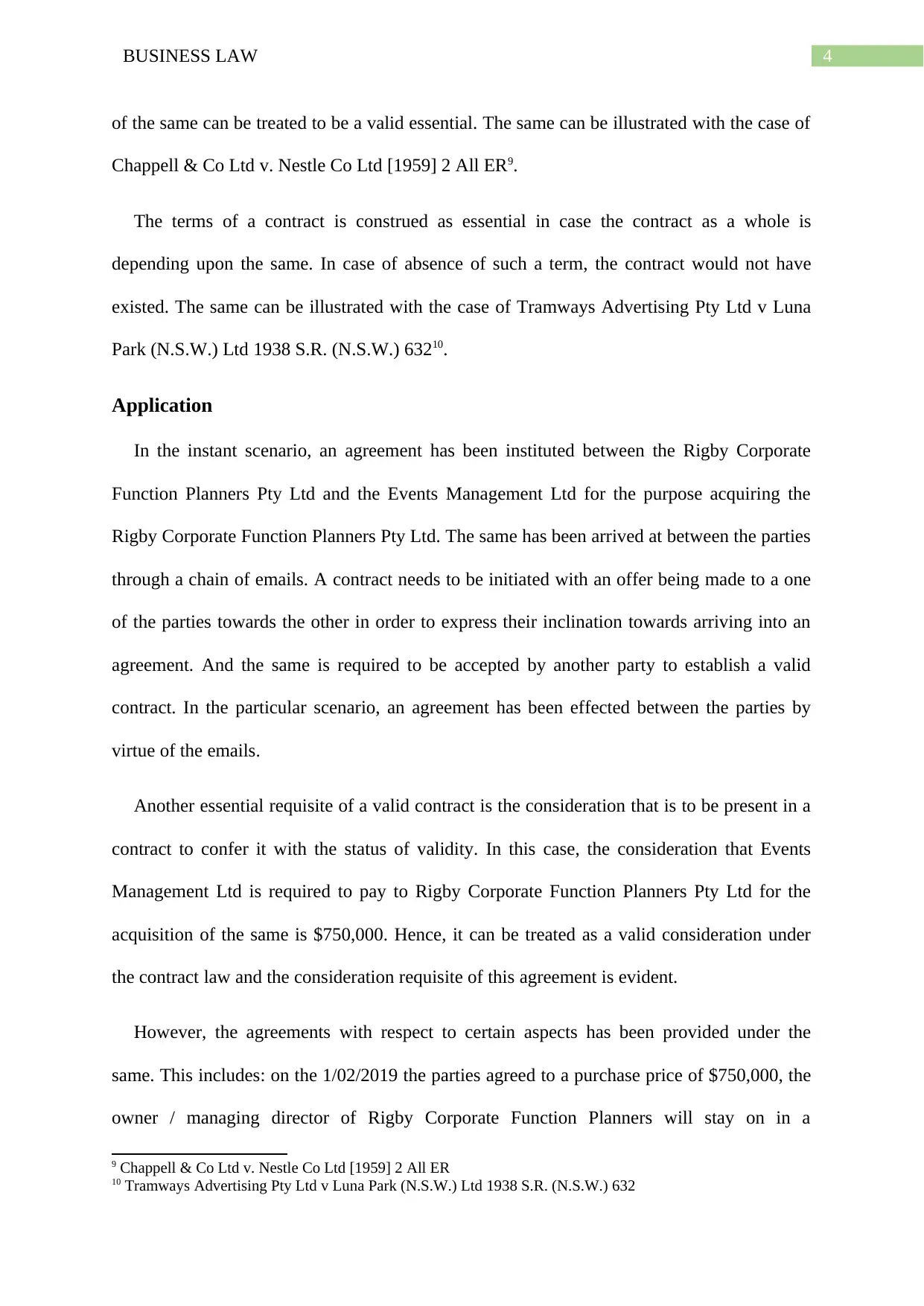
4BUSINESS LAW
of the same can be treated to be a valid essential. The same can be illustrated with the case of
Chappell & Co Ltd v. Nestle Co Ltd [1959] 2 All ER9.
The terms of a contract is construed as essential in case the contract as a whole is
depending upon the same. In case of absence of such a term, the contract would not have
existed. The same can be illustrated with the case of Tramways Advertising Pty Ltd v Luna
Park (N.S.W.) Ltd 1938 S.R. (N.S.W.) 63210.
Application
In the instant scenario, an agreement has been instituted between the Rigby Corporate
Function Planners Pty Ltd and the Events Management Ltd for the purpose acquiring the
Rigby Corporate Function Planners Pty Ltd. The same has been arrived at between the parties
through a chain of emails. A contract needs to be initiated with an offer being made to a one
of the parties towards the other in order to express their inclination towards arriving into an
agreement. And the same is required to be accepted by another party to establish a valid
contract. In the particular scenario, an agreement has been effected between the parties by
virtue of the emails.
Another essential requisite of a valid contract is the consideration that is to be present in a
contract to confer it with the status of validity. In this case, the consideration that Events
Management Ltd is required to pay to Rigby Corporate Function Planners Pty Ltd for the
acquisition of the same is $750,000. Hence, it can be treated as a valid consideration under
the contract law and the consideration requisite of this agreement is evident.
However, the agreements with respect to certain aspects has been provided under the
same. This includes: on the 1/02/2019 the parties agreed to a purchase price of $750,000, the
owner / managing director of Rigby Corporate Function Planners will stay on in a
9 Chappell & Co Ltd v. Nestle Co Ltd [1959] 2 All ER
10 Tramways Advertising Pty Ltd v Luna Park (N.S.W.) Ltd 1938 S.R. (N.S.W.) 632
of the same can be treated to be a valid essential. The same can be illustrated with the case of
Chappell & Co Ltd v. Nestle Co Ltd [1959] 2 All ER9.
The terms of a contract is construed as essential in case the contract as a whole is
depending upon the same. In case of absence of such a term, the contract would not have
existed. The same can be illustrated with the case of Tramways Advertising Pty Ltd v Luna
Park (N.S.W.) Ltd 1938 S.R. (N.S.W.) 63210.
Application
In the instant scenario, an agreement has been instituted between the Rigby Corporate
Function Planners Pty Ltd and the Events Management Ltd for the purpose acquiring the
Rigby Corporate Function Planners Pty Ltd. The same has been arrived at between the parties
through a chain of emails. A contract needs to be initiated with an offer being made to a one
of the parties towards the other in order to express their inclination towards arriving into an
agreement. And the same is required to be accepted by another party to establish a valid
contract. In the particular scenario, an agreement has been effected between the parties by
virtue of the emails.
Another essential requisite of a valid contract is the consideration that is to be present in a
contract to confer it with the status of validity. In this case, the consideration that Events
Management Ltd is required to pay to Rigby Corporate Function Planners Pty Ltd for the
acquisition of the same is $750,000. Hence, it can be treated as a valid consideration under
the contract law and the consideration requisite of this agreement is evident.
However, the agreements with respect to certain aspects has been provided under the
same. This includes: on the 1/02/2019 the parties agreed to a purchase price of $750,000, the
owner / managing director of Rigby Corporate Function Planners will stay on in a
9 Chappell & Co Ltd v. Nestle Co Ltd [1959] 2 All ER
10 Tramways Advertising Pty Ltd v Luna Park (N.S.W.) Ltd 1938 S.R. (N.S.W.) 632
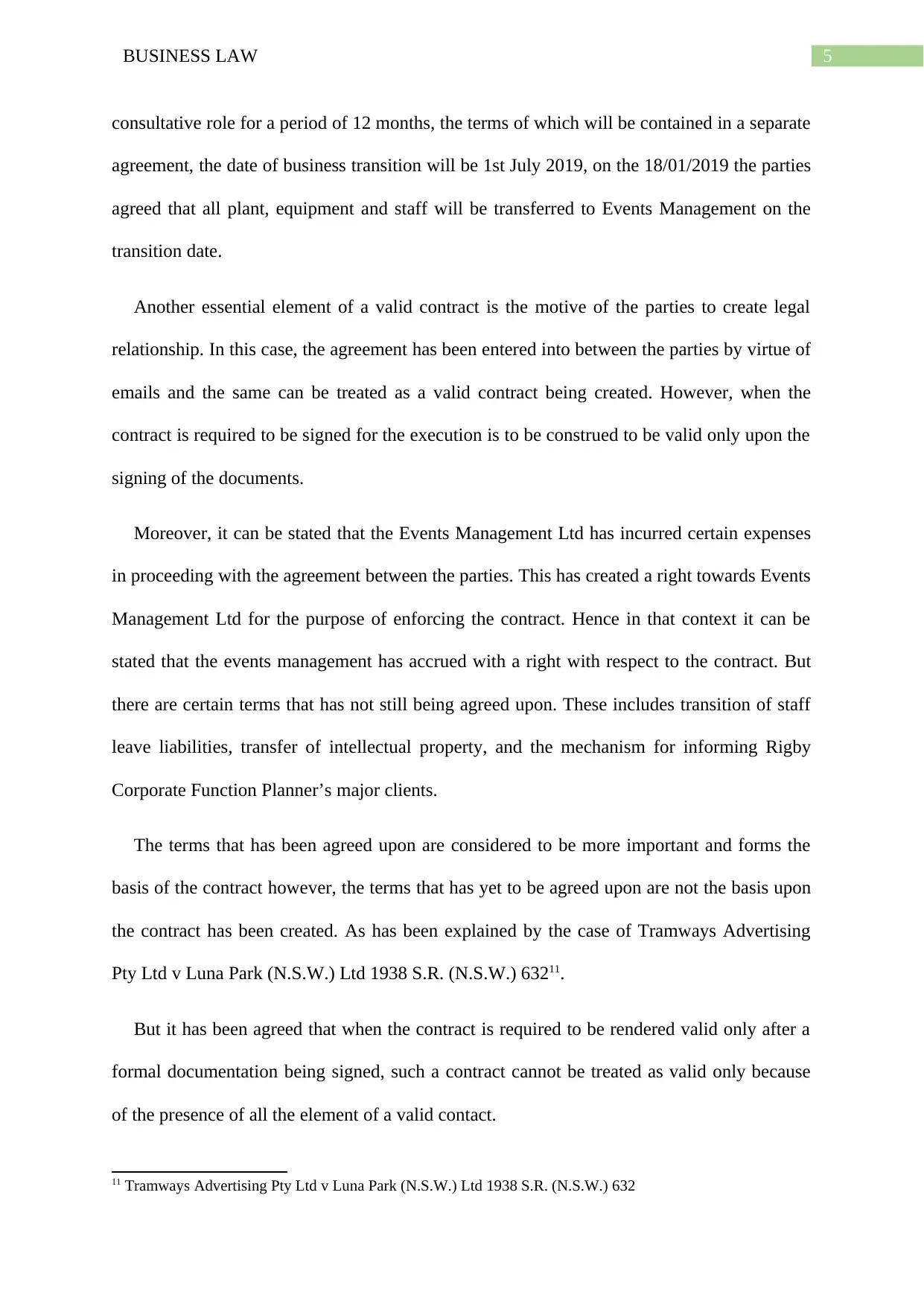
5BUSINESS LAW
consultative role for a period of 12 months, the terms of which will be contained in a separate
agreement, the date of business transition will be 1st July 2019, on the 18/01/2019 the parties
agreed that all plant, equipment and staff will be transferred to Events Management on the
transition date.
Another essential element of a valid contract is the motive of the parties to create legal
relationship. In this case, the agreement has been entered into between the parties by virtue of
emails and the same can be treated as a valid contract being created. However, when the
contract is required to be signed for the execution is to be construed to be valid only upon the
signing of the documents.
Moreover, it can be stated that the Events Management Ltd has incurred certain expenses
in proceeding with the agreement between the parties. This has created a right towards Events
Management Ltd for the purpose of enforcing the contract. Hence in that context it can be
stated that the events management has accrued with a right with respect to the contract. But
there are certain terms that has not still being agreed upon. These includes transition of staff
leave liabilities, transfer of intellectual property, and the mechanism for informing Rigby
Corporate Function Planner’s major clients.
The terms that has been agreed upon are considered to be more important and forms the
basis of the contract however, the terms that has yet to be agreed upon are not the basis upon
the contract has been created. As has been explained by the case of Tramways Advertising
Pty Ltd v Luna Park (N.S.W.) Ltd 1938 S.R. (N.S.W.) 63211.
But it has been agreed that when the contract is required to be rendered valid only after a
formal documentation being signed, such a contract cannot be treated as valid only because
of the presence of all the element of a valid contact.
11 Tramways Advertising Pty Ltd v Luna Park (N.S.W.) Ltd 1938 S.R. (N.S.W.) 632
consultative role for a period of 12 months, the terms of which will be contained in a separate
agreement, the date of business transition will be 1st July 2019, on the 18/01/2019 the parties
agreed that all plant, equipment and staff will be transferred to Events Management on the
transition date.
Another essential element of a valid contract is the motive of the parties to create legal
relationship. In this case, the agreement has been entered into between the parties by virtue of
emails and the same can be treated as a valid contract being created. However, when the
contract is required to be signed for the execution is to be construed to be valid only upon the
signing of the documents.
Moreover, it can be stated that the Events Management Ltd has incurred certain expenses
in proceeding with the agreement between the parties. This has created a right towards Events
Management Ltd for the purpose of enforcing the contract. Hence in that context it can be
stated that the events management has accrued with a right with respect to the contract. But
there are certain terms that has not still being agreed upon. These includes transition of staff
leave liabilities, transfer of intellectual property, and the mechanism for informing Rigby
Corporate Function Planner’s major clients.
The terms that has been agreed upon are considered to be more important and forms the
basis of the contract however, the terms that has yet to be agreed upon are not the basis upon
the contract has been created. As has been explained by the case of Tramways Advertising
Pty Ltd v Luna Park (N.S.W.) Ltd 1938 S.R. (N.S.W.) 63211.
But it has been agreed that when the contract is required to be rendered valid only after a
formal documentation being signed, such a contract cannot be treated as valid only because
of the presence of all the element of a valid contact.
11 Tramways Advertising Pty Ltd v Luna Park (N.S.W.) Ltd 1938 S.R. (N.S.W.) 632
⊘ This is a preview!⊘
Do you want full access?
Subscribe today to unlock all pages.

Trusted by 1+ million students worldwide
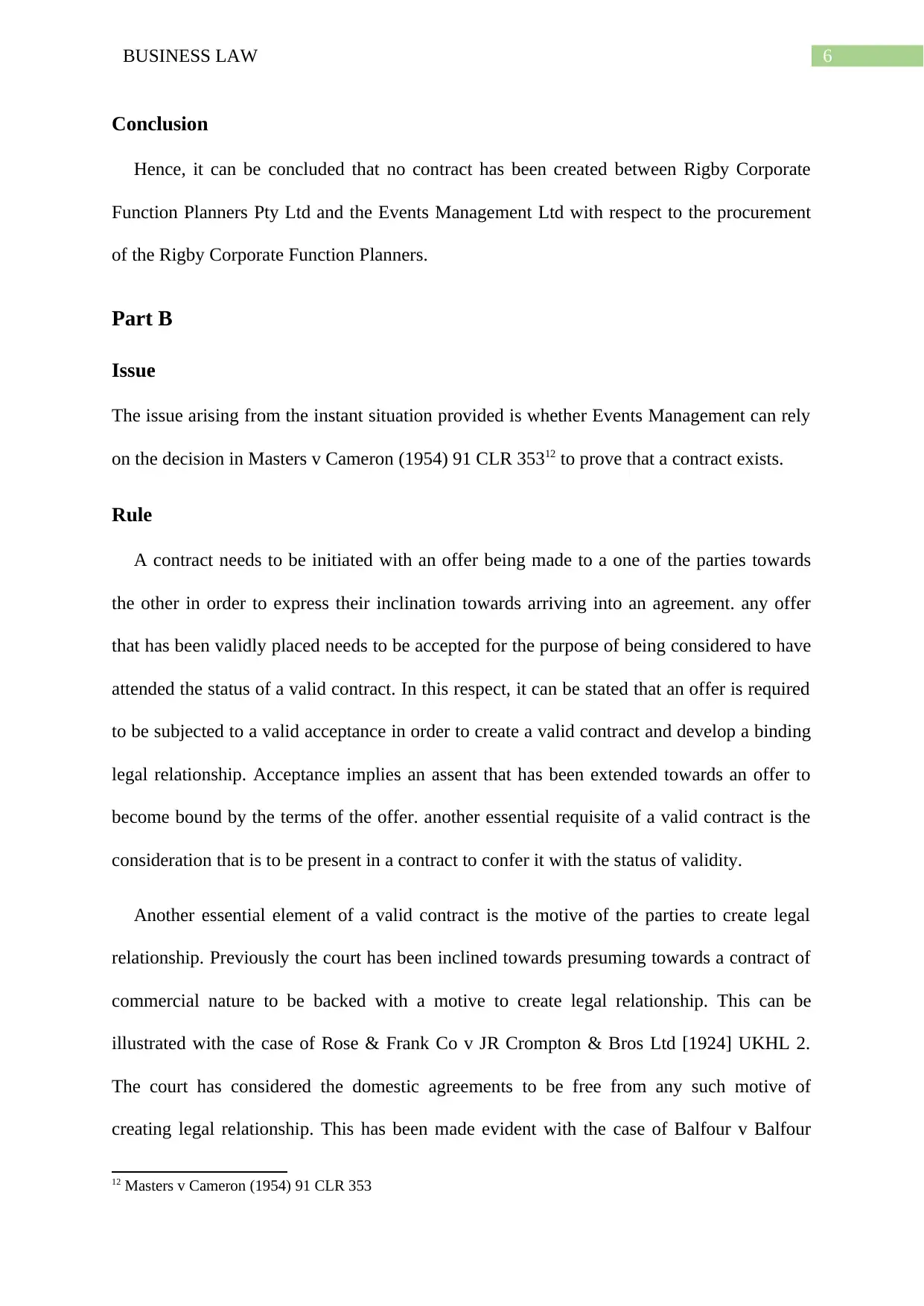
6BUSINESS LAW
Conclusion
Hence, it can be concluded that no contract has been created between Rigby Corporate
Function Planners Pty Ltd and the Events Management Ltd with respect to the procurement
of the Rigby Corporate Function Planners.
Part B
Issue
The issue arising from the instant situation provided is whether Events Management can rely
on the decision in Masters v Cameron (1954) 91 CLR 35312 to prove that a contract exists.
Rule
A contract needs to be initiated with an offer being made to a one of the parties towards
the other in order to express their inclination towards arriving into an agreement. any offer
that has been validly placed needs to be accepted for the purpose of being considered to have
attended the status of a valid contract. In this respect, it can be stated that an offer is required
to be subjected to a valid acceptance in order to create a valid contract and develop a binding
legal relationship. Acceptance implies an assent that has been extended towards an offer to
become bound by the terms of the offer. another essential requisite of a valid contract is the
consideration that is to be present in a contract to confer it with the status of validity.
Another essential element of a valid contract is the motive of the parties to create legal
relationship. Previously the court has been inclined towards presuming towards a contract of
commercial nature to be backed with a motive to create legal relationship. This can be
illustrated with the case of Rose & Frank Co v JR Crompton & Bros Ltd [1924] UKHL 2.
The court has considered the domestic agreements to be free from any such motive of
creating legal relationship. This has been made evident with the case of Balfour v Balfour
12 Masters v Cameron (1954) 91 CLR 353
Conclusion
Hence, it can be concluded that no contract has been created between Rigby Corporate
Function Planners Pty Ltd and the Events Management Ltd with respect to the procurement
of the Rigby Corporate Function Planners.
Part B
Issue
The issue arising from the instant situation provided is whether Events Management can rely
on the decision in Masters v Cameron (1954) 91 CLR 35312 to prove that a contract exists.
Rule
A contract needs to be initiated with an offer being made to a one of the parties towards
the other in order to express their inclination towards arriving into an agreement. any offer
that has been validly placed needs to be accepted for the purpose of being considered to have
attended the status of a valid contract. In this respect, it can be stated that an offer is required
to be subjected to a valid acceptance in order to create a valid contract and develop a binding
legal relationship. Acceptance implies an assent that has been extended towards an offer to
become bound by the terms of the offer. another essential requisite of a valid contract is the
consideration that is to be present in a contract to confer it with the status of validity.
Another essential element of a valid contract is the motive of the parties to create legal
relationship. Previously the court has been inclined towards presuming towards a contract of
commercial nature to be backed with a motive to create legal relationship. This can be
illustrated with the case of Rose & Frank Co v JR Crompton & Bros Ltd [1924] UKHL 2.
The court has considered the domestic agreements to be free from any such motive of
creating legal relationship. This has been made evident with the case of Balfour v Balfour
12 Masters v Cameron (1954) 91 CLR 353
Paraphrase This Document
Need a fresh take? Get an instant paraphrase of this document with our AI Paraphraser
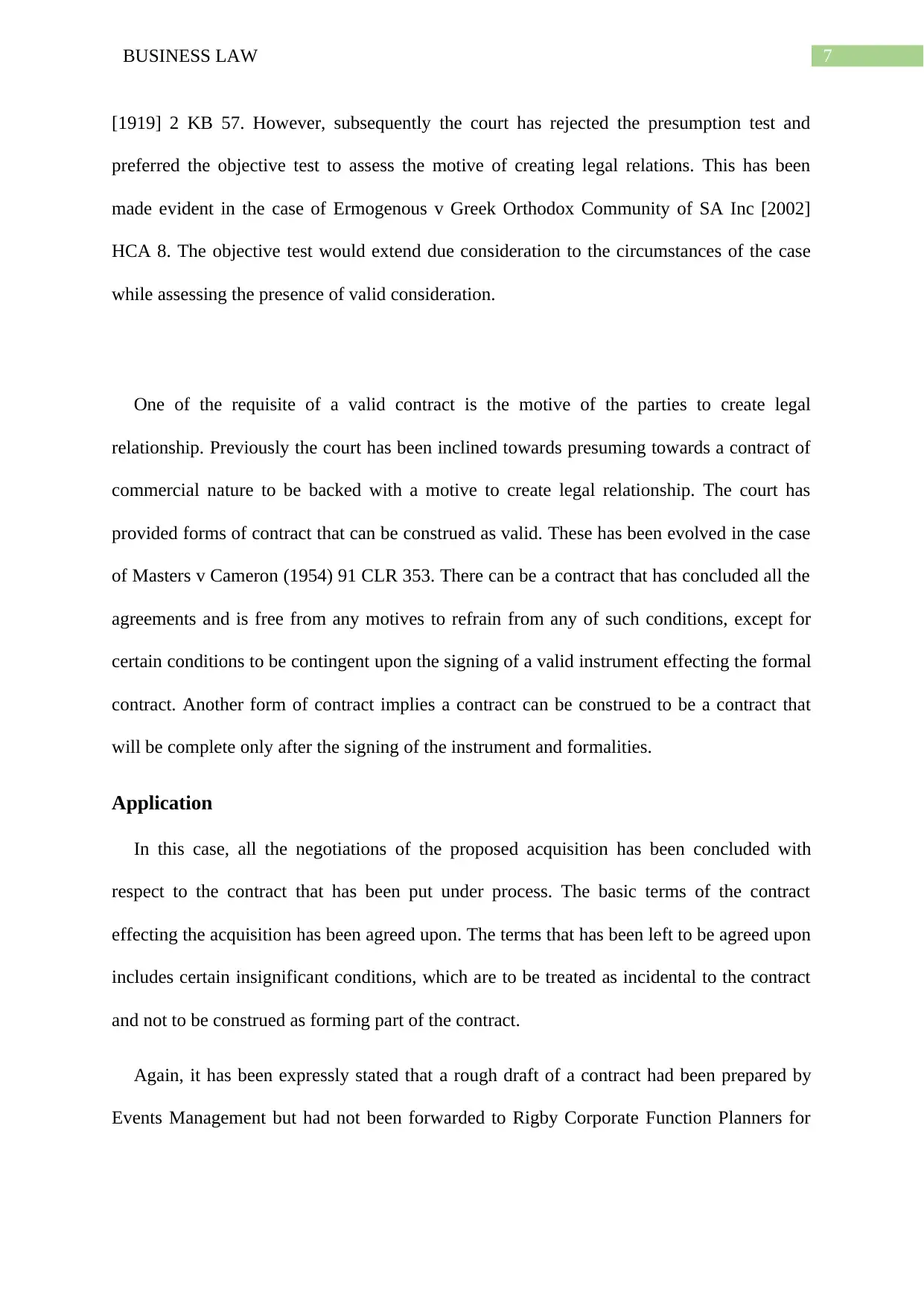
7BUSINESS LAW
[1919] 2 KB 57. However, subsequently the court has rejected the presumption test and
preferred the objective test to assess the motive of creating legal relations. This has been
made evident in the case of Ermogenous v Greek Orthodox Community of SA Inc [2002]
HCA 8. The objective test would extend due consideration to the circumstances of the case
while assessing the presence of valid consideration.
One of the requisite of a valid contract is the motive of the parties to create legal
relationship. Previously the court has been inclined towards presuming towards a contract of
commercial nature to be backed with a motive to create legal relationship. The court has
provided forms of contract that can be construed as valid. These has been evolved in the case
of Masters v Cameron (1954) 91 CLR 353. There can be a contract that has concluded all the
agreements and is free from any motives to refrain from any of such conditions, except for
certain conditions to be contingent upon the signing of a valid instrument effecting the formal
contract. Another form of contract implies a contract can be construed to be a contract that
will be complete only after the signing of the instrument and formalities.
Application
In this case, all the negotiations of the proposed acquisition has been concluded with
respect to the contract that has been put under process. The basic terms of the contract
effecting the acquisition has been agreed upon. The terms that has been left to be agreed upon
includes certain insignificant conditions, which are to be treated as incidental to the contract
and not to be construed as forming part of the contract.
Again, it has been expressly stated that a rough draft of a contract had been prepared by
Events Management but had not been forwarded to Rigby Corporate Function Planners for
[1919] 2 KB 57. However, subsequently the court has rejected the presumption test and
preferred the objective test to assess the motive of creating legal relations. This has been
made evident in the case of Ermogenous v Greek Orthodox Community of SA Inc [2002]
HCA 8. The objective test would extend due consideration to the circumstances of the case
while assessing the presence of valid consideration.
One of the requisite of a valid contract is the motive of the parties to create legal
relationship. Previously the court has been inclined towards presuming towards a contract of
commercial nature to be backed with a motive to create legal relationship. The court has
provided forms of contract that can be construed as valid. These has been evolved in the case
of Masters v Cameron (1954) 91 CLR 353. There can be a contract that has concluded all the
agreements and is free from any motives to refrain from any of such conditions, except for
certain conditions to be contingent upon the signing of a valid instrument effecting the formal
contract. Another form of contract implies a contract can be construed to be a contract that
will be complete only after the signing of the instrument and formalities.
Application
In this case, all the negotiations of the proposed acquisition has been concluded with
respect to the contract that has been put under process. The basic terms of the contract
effecting the acquisition has been agreed upon. The terms that has been left to be agreed upon
includes certain insignificant conditions, which are to be treated as incidental to the contract
and not to be construed as forming part of the contract.
Again, it has been expressly stated that a rough draft of a contract had been prepared by
Events Management but had not been forwarded to Rigby Corporate Function Planners for
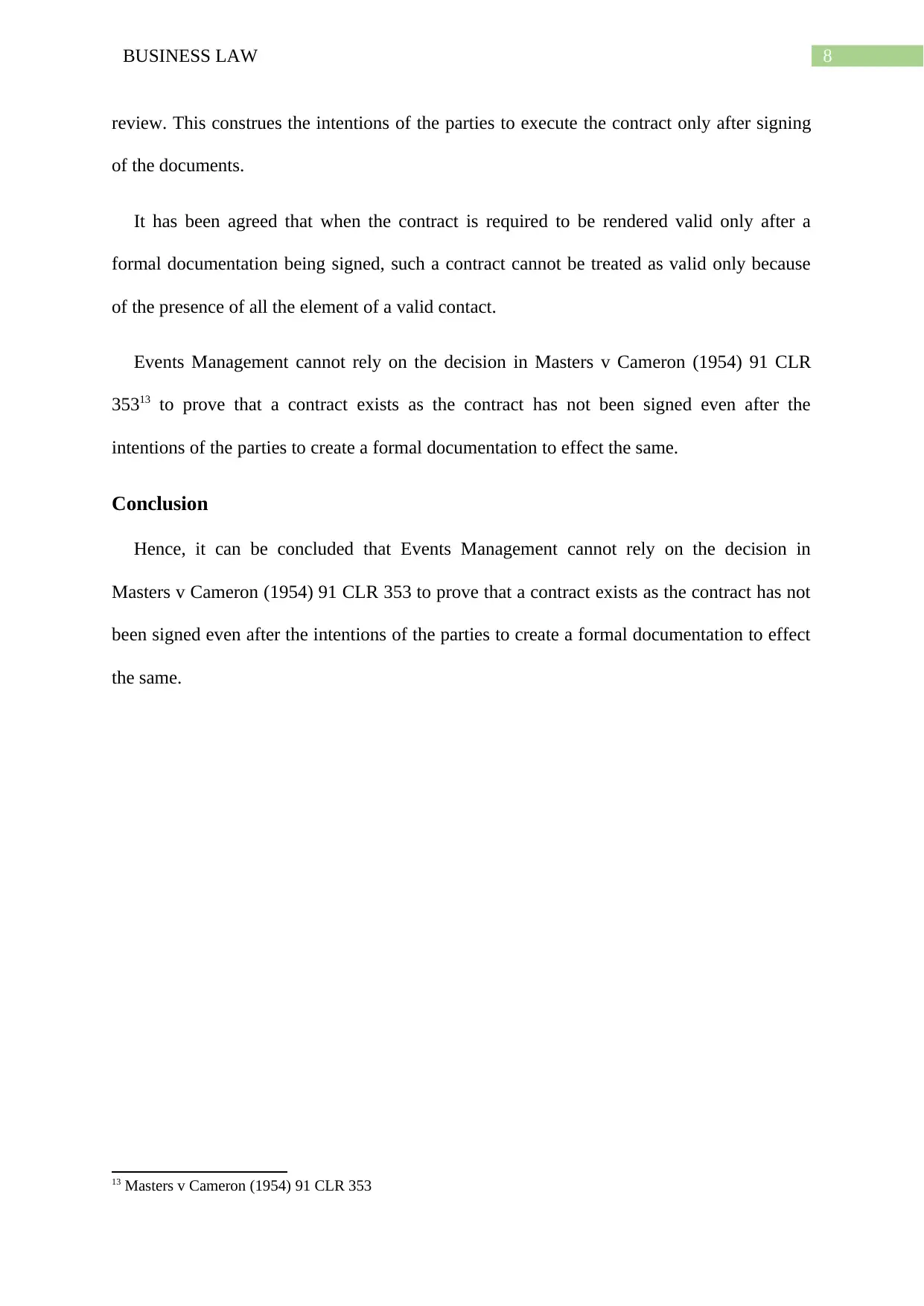
8BUSINESS LAW
review. This construes the intentions of the parties to execute the contract only after signing
of the documents.
It has been agreed that when the contract is required to be rendered valid only after a
formal documentation being signed, such a contract cannot be treated as valid only because
of the presence of all the element of a valid contact.
Events Management cannot rely on the decision in Masters v Cameron (1954) 91 CLR
35313 to prove that a contract exists as the contract has not been signed even after the
intentions of the parties to create a formal documentation to effect the same.
Conclusion
Hence, it can be concluded that Events Management cannot rely on the decision in
Masters v Cameron (1954) 91 CLR 353 to prove that a contract exists as the contract has not
been signed even after the intentions of the parties to create a formal documentation to effect
the same.
13 Masters v Cameron (1954) 91 CLR 353
review. This construes the intentions of the parties to execute the contract only after signing
of the documents.
It has been agreed that when the contract is required to be rendered valid only after a
formal documentation being signed, such a contract cannot be treated as valid only because
of the presence of all the element of a valid contact.
Events Management cannot rely on the decision in Masters v Cameron (1954) 91 CLR
35313 to prove that a contract exists as the contract has not been signed even after the
intentions of the parties to create a formal documentation to effect the same.
Conclusion
Hence, it can be concluded that Events Management cannot rely on the decision in
Masters v Cameron (1954) 91 CLR 353 to prove that a contract exists as the contract has not
been signed even after the intentions of the parties to create a formal documentation to effect
the same.
13 Masters v Cameron (1954) 91 CLR 353
⊘ This is a preview!⊘
Do you want full access?
Subscribe today to unlock all pages.

Trusted by 1+ million students worldwide
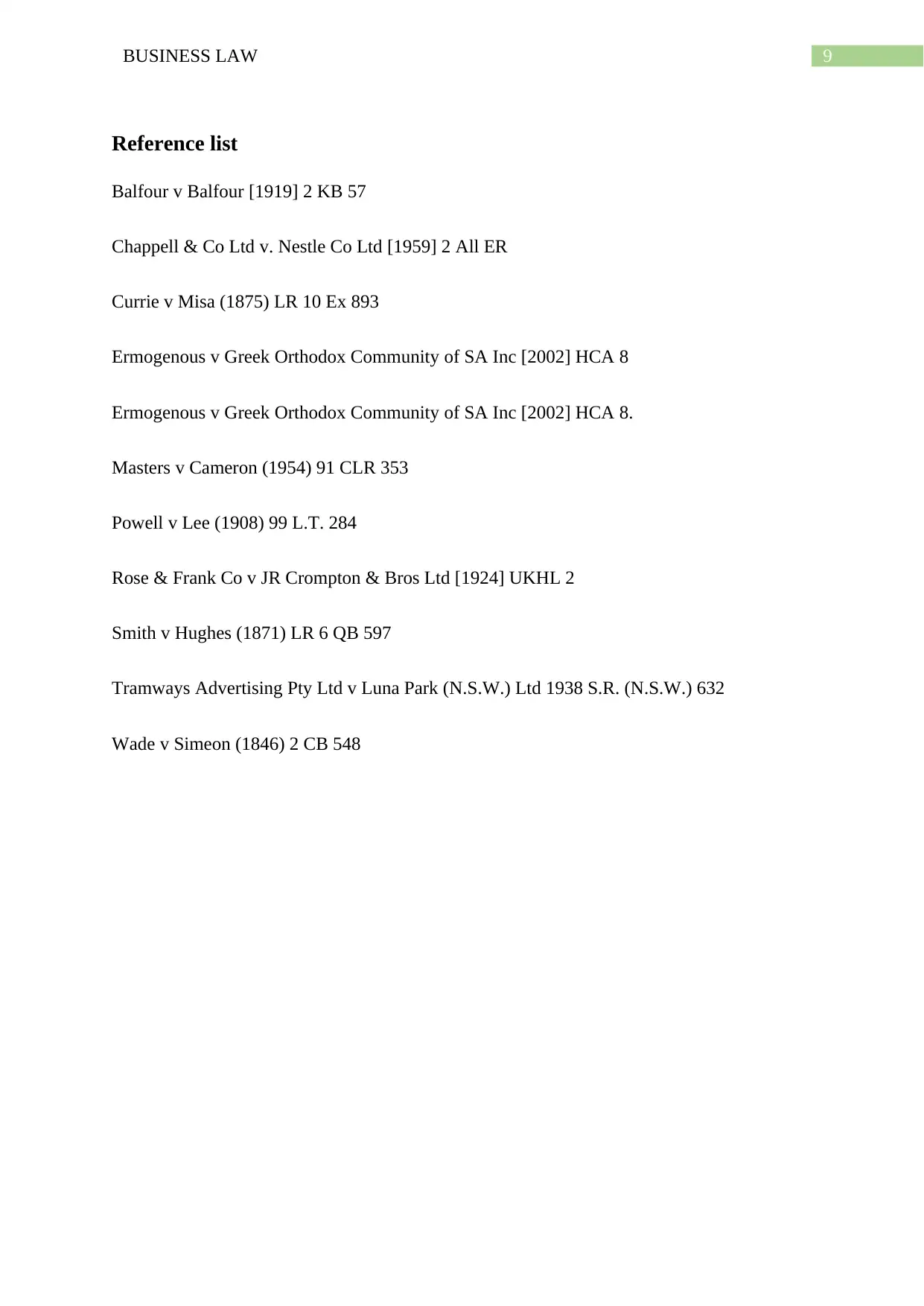
9BUSINESS LAW
Reference list
Balfour v Balfour [1919] 2 KB 57
Chappell & Co Ltd v. Nestle Co Ltd [1959] 2 All ER
Currie v Misa (1875) LR 10 Ex 893
Ermogenous v Greek Orthodox Community of SA Inc [2002] HCA 8
Ermogenous v Greek Orthodox Community of SA Inc [2002] HCA 8.
Masters v Cameron (1954) 91 CLR 353
Powell v Lee (1908) 99 L.T. 284
Rose & Frank Co v JR Crompton & Bros Ltd [1924] UKHL 2
Smith v Hughes (1871) LR 6 QB 597
Tramways Advertising Pty Ltd v Luna Park (N.S.W.) Ltd 1938 S.R. (N.S.W.) 632
Wade v Simeon (1846) 2 CB 548
Reference list
Balfour v Balfour [1919] 2 KB 57
Chappell & Co Ltd v. Nestle Co Ltd [1959] 2 All ER
Currie v Misa (1875) LR 10 Ex 893
Ermogenous v Greek Orthodox Community of SA Inc [2002] HCA 8
Ermogenous v Greek Orthodox Community of SA Inc [2002] HCA 8.
Masters v Cameron (1954) 91 CLR 353
Powell v Lee (1908) 99 L.T. 284
Rose & Frank Co v JR Crompton & Bros Ltd [1924] UKHL 2
Smith v Hughes (1871) LR 6 QB 597
Tramways Advertising Pty Ltd v Luna Park (N.S.W.) Ltd 1938 S.R. (N.S.W.) 632
Wade v Simeon (1846) 2 CB 548
1 out of 10
Related Documents
Your All-in-One AI-Powered Toolkit for Academic Success.
+13062052269
info@desklib.com
Available 24*7 on WhatsApp / Email
![[object Object]](/_next/static/media/star-bottom.7253800d.svg)
Unlock your academic potential
Copyright © 2020–2026 A2Z Services. All Rights Reserved. Developed and managed by ZUCOL.





